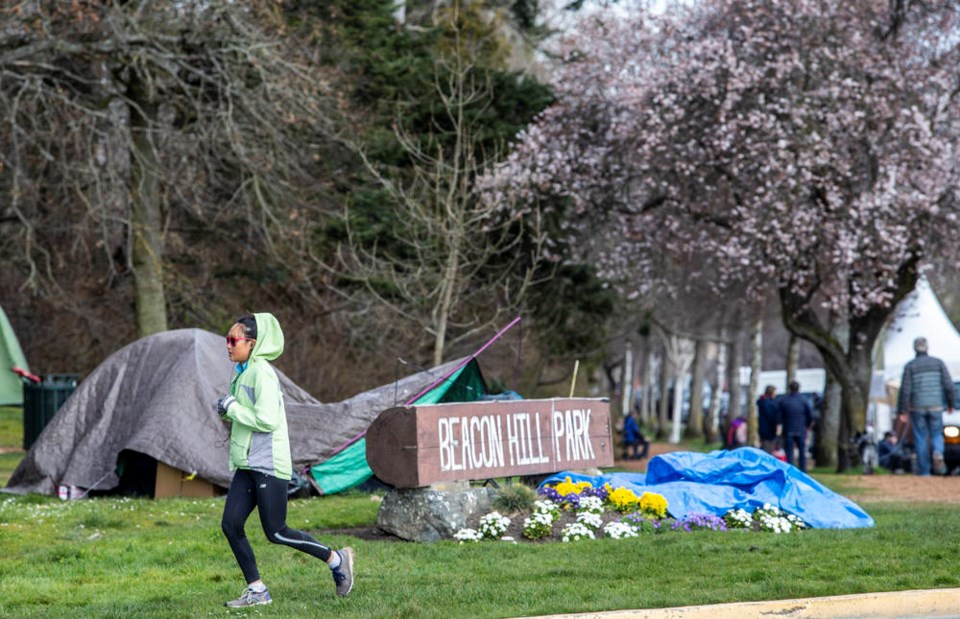People without homes will no longer be able to camp around the clock in Victoria’s parks as of May 1.
Victoria council voted late Thursday to reinstate the old rules that permit people to pitch their tents only from dusk to dawn and require them to pack up their belongings by 7 a.m. each morning.
Council eased the restrictions last year after COVID-19 forced homeless shelters to close or reduce the number of available beds, shunting hundreds of people to the streets.
Since then, the provincial government has leased or purchased a number of hotels to provide supportive housing for people without homes.
David Eby, the minister responsible for housing, announced last week that the province will have secured enough housing to offer more than 200 people still living in the parks or on the streets a place to live by the end of April.
That commitment prompted Victoria council to give three readings to a bylaw that will bring an end to all-day camping effective May 1.
Council adopted the bylaw in a 7-2 vote late Thursday.
Coun. Ben Isitt and Coun. Sharmarke Dubow opposed the move. Isitt argued for a delay, given that the province has yet to confirm some of the housing options.
He also expressed concern that people will not be able to move into a tiny-homes village in the parking lot at Royal Athletic Park until the end of April. Council approved a temporary-use permit Thursday that allows the Greater Victoria Coalition to End Homelessness and Aryze Developments to install 30 homes built from shipping containers in the lot for up to 18 months.
“It feels like we’re, I guess, rushing toward changing regulations when there’s still a lack of clarity over those options for individuals,” Isitt said.
But Mayor Lisa Helps said the city is working with B.C. Housing to make sure that everybody living in a park is offered a space by mid-April.
“So that will provide a 15-day transition period — even if there will be a lot of moving in the last few days of April,” she said.
In a related move, councillors voted to keep Centennial Square and Central Park on the list of parks where camping is prohibited and to add Cecelia Ravine Park. Helps argued in support of the bans, saying the neighbourhoods near those parks already have a number of supportive housing projects.
The North Park Neighbourhood Association welcomed the decision, noting that a significant number of their residents live in apartments without backyards or lack the resources to travel in search of greenspace.
“The other thing is, there’s already two other locations for sheltering within one block,” said Sarah Murray, executive director. “So everyone needs access to greenspace — including the folks who will be living at the tiny-home community, including the folks who are living in the arena.”
Elizabeth Cull, chair of the Burnside Gorge Community Association’s board, was glad to see Cecelia Ravine added to the list, given that that the community is still dealing with issues associated with the temporary shelters in hotels along Gorge Road.
The association also supports the end to daytime camping, she said. “If there’s enough [indoor] space, that’s where people should be. And if there isn’t enough space, then the province and the city have got to work on that, from our perspective.”
But Roy Fletcher of the Friends of Beacon Hill Park Society remains skeptical that much will change on May 1. “This has just gone on for so long,” he said. “The campers just don’t take it seriously at all.”
He said the city will have to stringently enforce the new rules. “And they’re not going to do it,” he said. “It won’t make much difference at all.”



